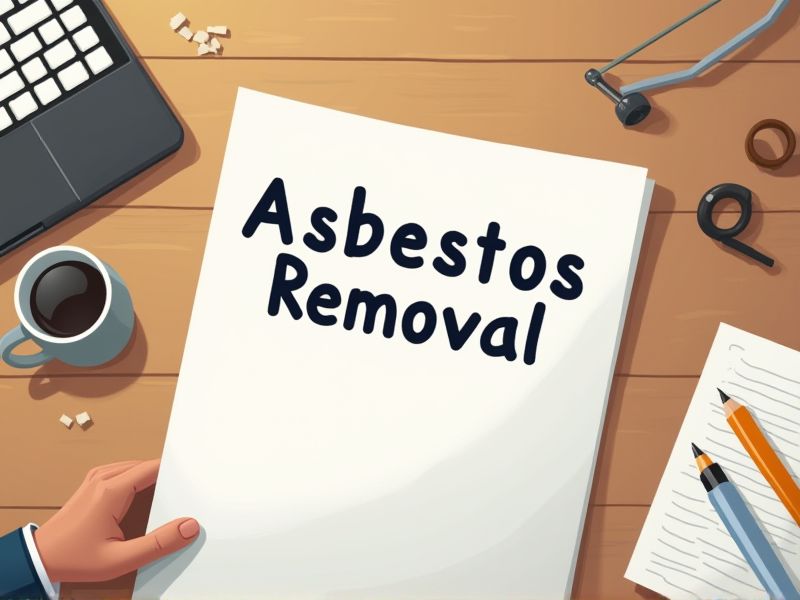
Asbestos poses significant health risks, making its removal a highly regulated process. Technicians in this field require certain certifications to ensure they handle materials safely and in compliance with legal standards. These certifications empower them with knowledge on the proper techniques and equipment needed to minimize exposure and contamination. Here are some important certifications you may need as an Asbestos Removal Technician.
Asbestos Abatement Worker Certification
The certification ensures that asbestos removal technicians are knowledgeable about safe handling and disposal methods, reducing the risk of asbestos exposure to themselves and the public. Asbestos poses significant health hazards, and trained workers are able to identify and manage these risks effectively. Certification enforces compliance with federal and state regulations, which can protect employers and workers from legal and financial penalties. Recognized training also enhances a technician's professional credibility and job opportunities in a field that prioritizes safety and expertise.
Asbestos Abatement Supervisor Certification
An Asbestos Abatement Supervisor Certification is necessary because it ensures proper knowledge of safe handling procedures, minimizing health risks associated with asbestos exposure. This certification aligns with regulatory compliance, as it adheres to local and national safety standards mandated for asbestos work. Possessing this certification also indicates mastery in managing and leading a team effectively during asbestos removal operations. Furthermore, it demonstrates a commitment to maintaining a high level of safety and professionalism in hazardous environments.
OSHA HAZWOPER Certification
Asbestos poses significant health risks, including lung cancer and mesothelioma; therefore, OSHA HAZWOPER Certification ensures technicians understand safe handling procedures. The certification provides crucial training on hazardous waste operations and emergency response, minimizing exposure risks. Without proper certification, technicians might inadvertently release asbestos fibers, leading to health hazards and regulatory violations. Regulatory compliance with OSHA standards prevents legal repercussions for companies involved in asbestos removal.
OSHA 30-Hour Construction Safety Certification
The OSHA 30-Hour Construction Safety Certification equips asbestos removal technicians with comprehensive knowledge on identifying and managing potential hazards, which reduces the risk of health complications such as asbestosis and mesothelioma. Proper training through OSHA standards ensures that technicians implement effective safety protocols, minimizing the likelihood of airborne asbestos exposure. Improved safety awareness and adherence to regulations foster a safer work environment, aligning with federal requirements and reducing the chances of costly legal liabilities. Enhanced understanding of safety measures promotes efficient operational practices, leading to increased productivity and reduced downtime arising from accidents or non-compliance issues.
EPA Asbestos Training Certification
Asbestos is a hazardous material, and improper handling can lead to serious health risks, prompting the necessity for specialized training and certification. The EPA's asbestos training certification ensures that technicians are knowledgeable about safe removal procedures, reducing the risk of asbestos exposure. Compliance with federal regulations mandates this certification to maintain workplace safety and public health. Certified technicians can follow legal requirements and safety protocols, minimizing environmental contamination and legal liabilities for employers.
State-Specific Asbestos Abatement License
State-specific asbestos abatement licenses are required due to varying regulations and safety standards across different regions, ensuring compliance with local laws. These licenses validate that technicians have received appropriate training pertinent to the specific state, enhancing worker and public safety. Variation in environmental conditions and building materials between states necessitates specialized knowledge and techniques in asbestos handling. Licenses also provide a legal framework that holds technicians accountable for their work quality, reducing health risks associated with improper asbestos removal.
Hazardous Materials Technician Certification
Asbestos poses severe health risks, such as respiratory diseases, leading to strict removal regulations. Obtaining a Hazardous Materials Technician Certification ensures technicians can safely handle and dispose of asbestos. Certified technicians are equipped with the proper knowledge to minimize exposure and prevent contamination. Regulatory compliance requires certified personnel to mitigate potential legal and financial liabilities for companies.
Certified Industrial Hygienist (CIH)
The involvement of a Certified Industrial Hygienist (CIH) ensures adherence to regulatory standards during asbestos removal, minimizing health risks. Expertise from a CIH is crucial in assessing potential hazards and determining appropriate protective measures for workers. Their oversight guarantees that removal procedures effectively prevent asbestos fibers from contaminating the environment. Compliance with safety guidelines and best practices, guided by a CIH, reduces liability and potential legal issues for the involved parties.
Certified Safety Professional (CSP)
Possessing a Certified Safety Professional (CSP) certification ensures expertise in recognizing and mitigating health risks associated with asbestos exposure. With rigorous safety standards required in asbestos removal, a CSP-certified technician demonstrates a commitment to maintaining compliance with Occupational Safety and Health Administration (OSHA) regulations. The certification validates proficiency in implementing crucial safety plans, preventing harmful exposure to workers and the environment. Employers gain a competitive edge as clients prefer technicians who uphold high safety standards, minimizing liability concerns in asbestos-related projects.
Environmental Health and Safety (EHS) Certification
Asbestos poses severe health risks, including lung cancer and mesothelioma, necessitating rigorous safety protocols for its removal. EHS Certification ensures that technicians understand these hazards and are trained in safe handling and disposal procedures. Improper removal of asbestos can result in airborne fibers that endanger public health and violate environmental regulations. EHS Certification validates a technician's capability to effectively mitigate risks and comply with legal safety standards.
Summary
By acquiring certifications in asbestos removal, you enhance both your credibility and marketability in the industry. These credentials can lead to more job opportunities and potentially higher wages due to your verified expertise. Certification also ensures that you're equipped with the latest, safest techniques, reducing the risk of health hazards. The industry's trust increases in your professional ability, resulting in greater career stability and growth possibilities.
